How to Make a Bonkers Low Budget Sci-fi Gem With 'Tim Travers'
Filmmakers Stimson Snead, Sam Dunning, and Felicia Day discuss recycling props, investing in the right equipment, and mastered genre for their indie sci-fi masterpiece Tim Travers and the Time Traveler's Paradox.
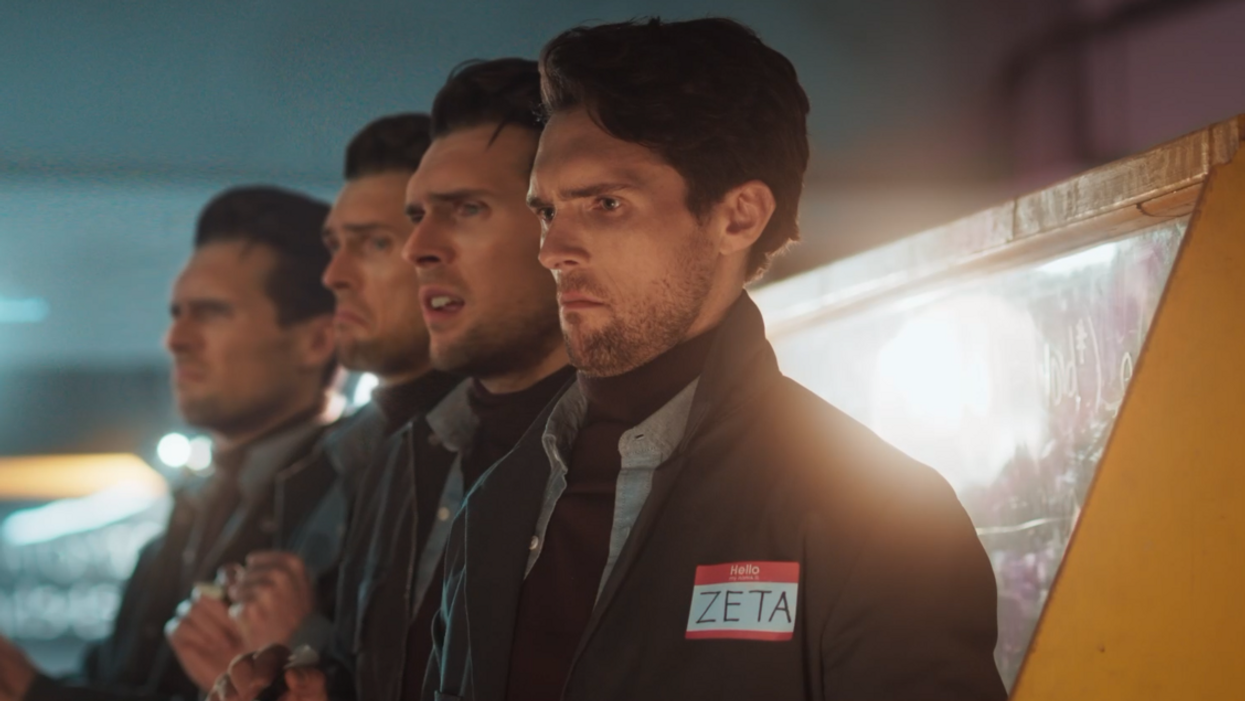
Tim Travers and the Time Traveler's Paradox
What happens when an egotistical scientist filled with malaise decides to test the paradoxical theory of a time traveler traveling back in time one minute to kill the younger version of themself? I'm sure you've all been wondering. And, lucky for you, writer-director Stimson Snead's Tim Travers and the Time Traveler's Paradox exists in our current timeline and is seeking wider distribution.
It's also a ton of fun and a true testament to sci-fi filmmaking.
I caught Tim Travers (forgive the shorthand you get it) at its world premiere at Cinequest and had an absolute blast. Snead and his leading performance cohorts Sam Dunning and Felicia Day (along with the rest of the crew of course) craft a low budget sci-fi movie that is tonally pitch perfect. It's funny, goes off the rails in all the best ways, and has some killer bit parts that I can't wait to find a wider audience. Also, in a very No Film School friendly way, looks incredible for a low budget sci-fi piece of this caliber.
It's impressive! In fact, it won the jury prize for best comedy feature at Cinequest. Wow.
Below, writer-director Stimson Snead, Executive Producer and actor Felicia Day, as well as (one of very many) Tim Travers himself Sam Dunning discuss the process of making Tim Travers. They're charming and funny and have lots of great insight into indie filmmaking.
Please, please do enjoy the read.
'
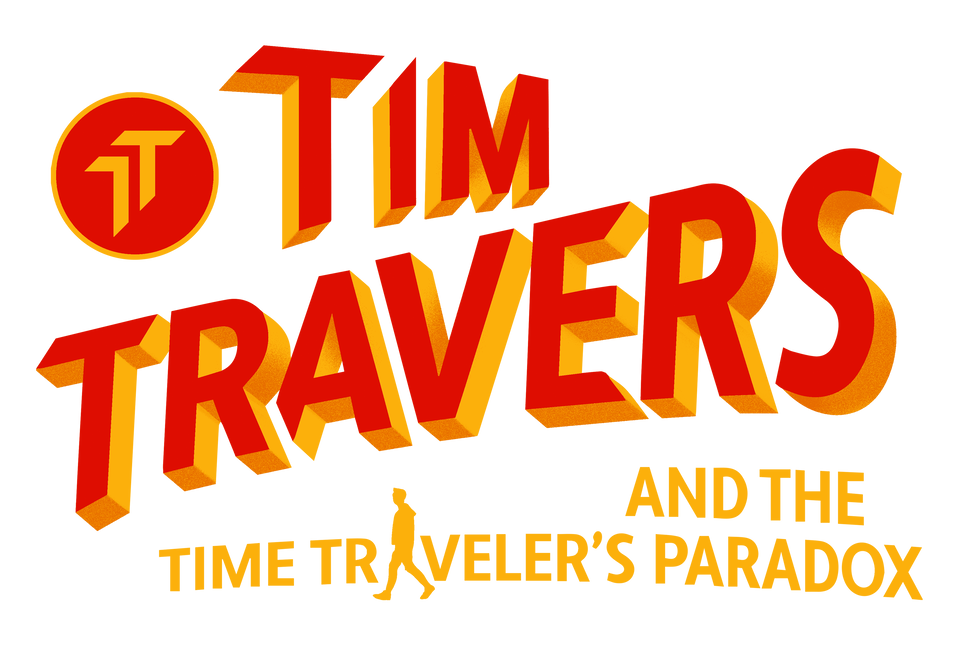
Editors Note: The following interview is edited for length and clarity.
No Film School :Tell me a little bit about making a low budget sci-fi genre extravaganza.
Stimson Snead: I'm not sure it's that different from making any other low budget film. You don't want to feel the low budget. You want to make a good film. It's just that because we're doing sci-fi and stuff like that, we're having to deal with certain extra challenges. How do we make effects work? We don't want our effects to be jokey and silly, so we have to be really judicious about where we're going to apply it, so we can get the most bang for our very limited dollar. A lot of that stuff doing practicals, where it's actually going to be most financially reasonable.
Because a lot of the film takes place in one big room, it's a huge room. It's a warehouse. What we did was we did no CG in there. We built out everything we needed in this warehouse. We tried to make each corner of the room its own very specific vibe and area, so that it would feel like more locations, than it actually is.
The other thing we do is we recycled props like nobody's business. The production team that did it was the same guys who produced the show Z Nation, which was running for several years. We borrowed a bunch of old retired props from their folks on it. I had just done a short about a group of people trapped inside a human sized rat cage, with a hamster wheel. We took that entire set, which still existed, turned it inside out, made that into the radiation chamber, and reused the hamster wheel, because damn it, I've got a seven-foot tall, fully functioning human hamster wheel. I am going to get my money's worth out of it.
Sam Dunning: I need to throw Sam in it.
Stimson Snead: Yes. Sorry about that, because the thing is a death trap, absolute death trap. You get some speed going, it'll take your arm off.
Naturally, the entire crew was playing with it, whenever myself and the producers weren't looking.
NFS: How could you not?
Stimson Snead: I don't fault the impulse. I mean, if I saw a giant human hamster wheel, and I wasn't the one paying for the insurance, I would be in that thing so fast, just immediately.
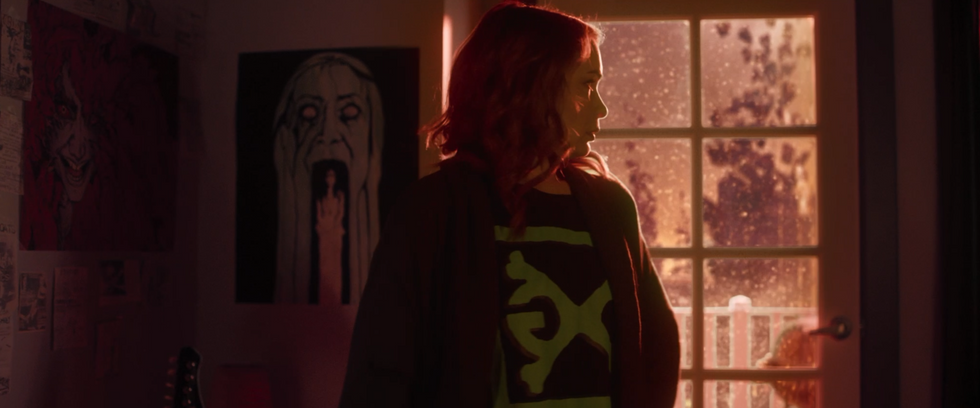
NFS:How was working on Tim Travers different or similar to other, I guess, genre projects that you've been a part of?
Sam Dunning: Well, I mean that's an easy one, and a hard one, because it's incomparable to any other genre stuff I've done, because it's fucking insane.
Felicia Day: It's a hot fever dream.
Sam Dunning: Yeah. I mean, there was basically no time I was not on set. There was one of me everywhere at all times in this thing, and most of the time I'm acting against myself, or I'm acting against Babbitt, my wonderful body double, who's doing his best to keep up. But it's not totally his job, but he's still doing everything he can, or I'm acting against nothing. Our script supervisor doing his best, from 50 feet over there yelling, "What do you mean by that?" Me reacting to that as if I'm saying it to Felicia right now. It's just that... yeah, so very different from most things.
It was a lot of fun, but what I tried to make it most similar to in my head, as it's like when you're a little kid. I was an only child growing up, just making up playing by yourself, and so you're making up characters and situations, everything, and so it's akin to that feeling, in a weird way.
I don't think I was doing that intentionally. I wasn't like, "Ah, I'm going to be this." It was just like a, "Well, I have to imagine all this shit is happening around me, plus all the visual effects we don't have going on, so I'm fully in." Yeah. I imagine it's similar to what everybody goes through on big green screen productions where they're like, "The Dragons coming now."
Felicia Day: You're really prepped for a Marvel movie right now. You really have the skill.
Sam Dunning: Tell them.
Felicia Day: I will. We'll send a note.
I mean, it's crazy what he had to do, because he's acting with 20 different versions of himself, and it's just pretty phenomenal. I mean, again, I haven't seen it, but when I read the script I was like, "I don't know how this guy's going to pull this off." From all the other reviews, and the people who've seen it, I'm like, "It got pulled off," and I'm really excited.
Stimson Snead: Yeah. One of the things I have just found, especially on a project like this, it has really made me love the faith of actors. Because you guys basically, on 90% of this production, there's nothing beyond me just saying, "Trust me, it's going to work."
Sam Dunning: Well, I had the advantage of working with you in the short, so I knew it was going to work.
Felicia Day: Yeah, the short was great. You have a proof of concept.
Stimson Snead: Had you seen the short before we did?
Felicia Day: Yeah, I did. Oh, yeah. I wasn't just going to fly. No offense, but I mean, I'm from the world of red video. I've seen badly edited things. I've seen badly executed things. I've done badly executed things. You've got to be careful. But at the end of the day, yeah, it is a trust call, because you can make or break anybody's performance, good or bad in the moment, with editing, and you can... production value, CGI, everything. The director and the post team really have a lot of control in making actors look good or bad, and you just have to be like, "I think this person doesn't have a vendetta against me. I think they're going to make me look good."
NFS: Yeah, I like that. I've never really thought about that before, but that does make a ton of sense that actors really are just like, "Well, I hope this is good."
Felicia Day: Yeah, yeah. I mean, it is a nice like, "Okay, I'm going to do my best. I can't control it." I know we've all seen movies where great actors were bad, or in our opinion bad, and we don't know. We don't if that was all these filmmakers making them look good, up until that point, or it's just that one filmmaker just didn't have the right instincts to tailor that performance. That's why a lot of actors do theater, because at least you have control over that. But you've got to show up physically multiple times in a row. That seems unappealing to me.
Sam Dunning: This is as close to theater as I've ever gotten, myself.
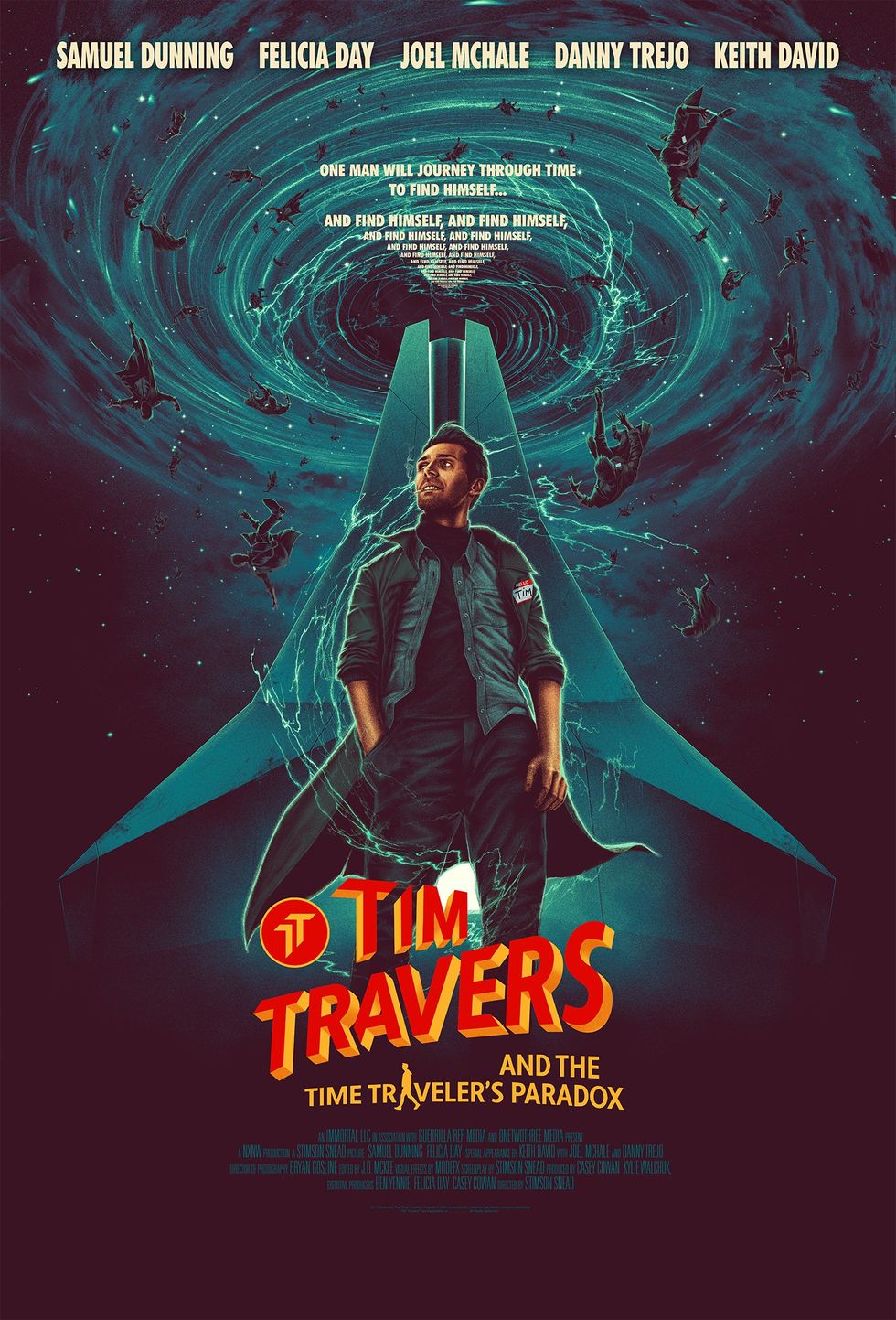
NFS: On a tight budget, what camera kit are you using? You're in a warehouse, and everything is pretty controlled?
Stimson Snead: I heard an expression on a short that I was AD-ing on years and years ago, "We are too poor to be cheap." There is a point where trying to save money will cost you more money in the long run, to do it wrong. When you're getting to something as major as literally the camera itself, that is the wrong place to save money. That is, you get the very best one you possibly can get your hands on, if the DPs... DPs are going to ask you for a lot of stuff you have to say no to, because they want everything. But get them the best camera you can, and the best lens package you can get.
With this one, we actually had to go with a fairly boring lens package for it, the Sigma series, which are great lenses, but they don't have a lot of character. We had to go with that specifically, because we knew of the just ridiculous amount of effects work that was going to be done on this project, because of all this. I think we clocked in somewhere around 540 something effect shots, and half of them are split screens of Sam. It's like, "All right, picking the right package for that."
But that's the wrong place to save money. What's the best camera you have access to? That one. Assuming you have a DP who knows how to operate it, because you can create a whole bunch of different problems for yourself.
Save money on the catering, not the camera.
Felicia Day: No, wrong, wrong. Use an iPhone, and get good burritos.
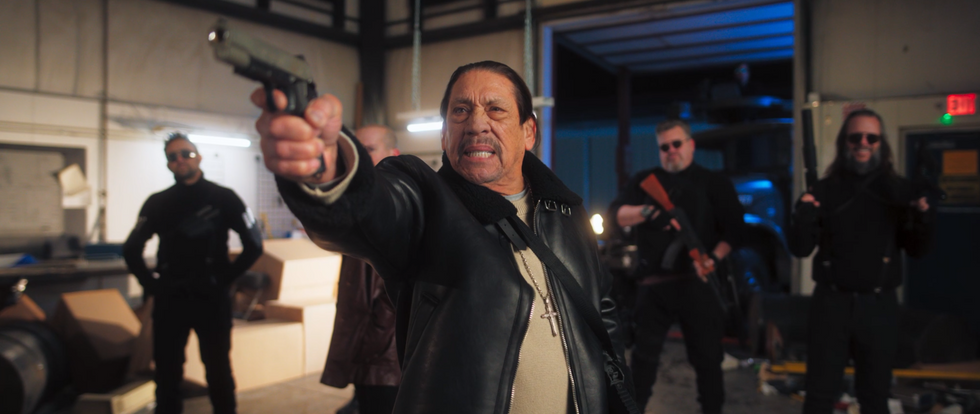
NFS: It sounds like you probably were in a lot of makeup and prosthetics, but was that for the practical effects? I don't know your characters, because I haven't seen it yet.
Sam Dunning: There is a point at which I do have, that's not... it was mostly contacts and a wig.
Stimson Snead: We went out of our way to not alter his look between the Tims more than we had to. Because we would have these scenes, where you'll have 9 to 10 him on camera. It's already a nightmare keeping track of whose who, as it is, and each one of them does have a name tag, which is not random. You can actually track each Tim throughout the film, if you're being eagle eyed about the name tags.
Felicia Day: Wow.
Stimson Snead: We labeled them. But it would've been... the closest we got to altering their appearance is we had Sam, depending on the Tim it was, he would make minor adjustments to how that particular Tim would wear his clothing. One Tim, for example, who is the most asshole-y, always has his collar popped and his sleeves rolled up. Later on, just as a nod to that, there's a bit where another Tim is starting to act like the asshole-y Tim, and Sam signified it with him rolling up his sleeves, in that moment.
Felicia Day: Oh, wow.
NFS: Are there also multiple Felicias, not just multiple Sams?
Felicia Day: I'm not going to spoil anything. I do get to scream really loud, which everybody was complimenting me after that, and it seemed like to be the height of my performance. I don't know if that really reflects on my abilities, but you take it where you can get it.
NFS: Yeah. That's cool. Danny Trejo is also in the film.
Stimson Snead: He is.
NFS: And Keith David, that's cool.
Stimson Snead: Oh, my god. Keith David's one of those people where when I met him, we gave him this tour around set. He actually has this very lovely soft speaking voice, and I was in the room when he switched into acting mode. I had to take a step back. He shook the foundations of the building with his voice.
I had a good 40 minutes to an hour of just talking to him, so it took me off guard when it happened. Holy shit.
Sam Dunning: The funniest was whenever you'd get him to laugh about anything. You'd say something to him, he was, "Ha, ha."
Felicia Day: It was. It was large.
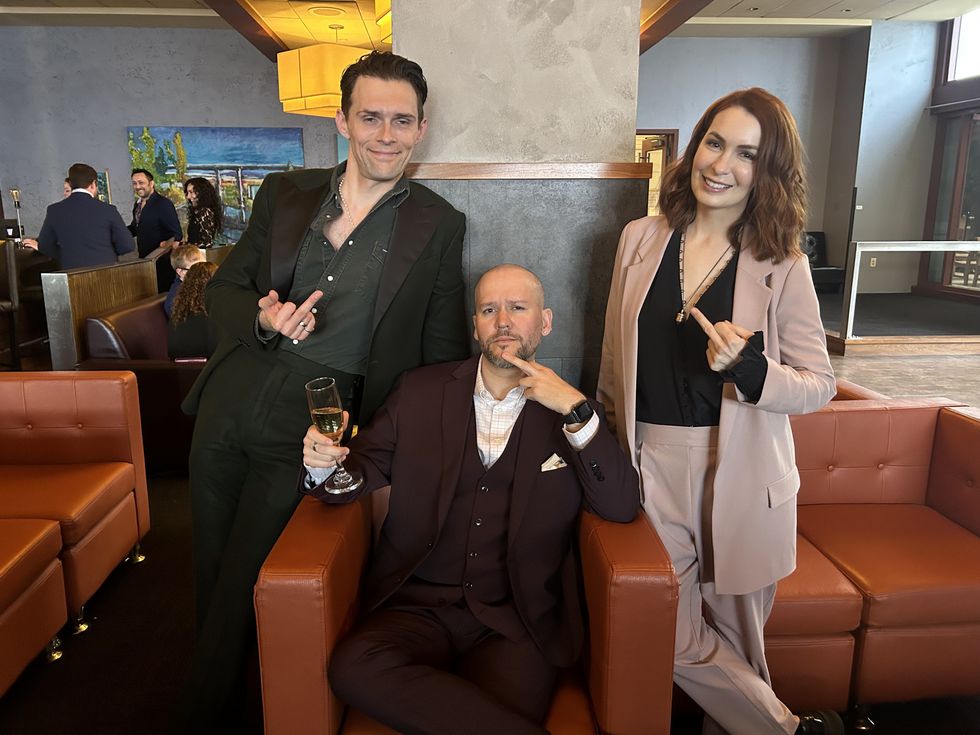
NFS: I'd normally do this closer to the end, but I don't want to run out of time, and I want to give everyone a chance to say their take. But I always like to ask the question, "What's your advice to filmmakers?"
Sam Dunning: My advice to filmmakers, well, as someone who went to film school and got absolutely nothing out of it, don't do it. Just make a movie.
I'd say, I mean, I got into making things, because I was an actor and I wasn't getting the roles that I wanted. My advice usually goes to other actors who are feeling beholden to the industry, but I think it's the same for filmmakers, especially if somebody's waiting for a directorial project, or something like that. It's like, don't fucking wait. Just go fucking make something. It doesn't matter what it is, just do it.
Because the only reason I am on this movie, is because I made a short, because I was tired of waiting around for roles. This man saw it, at a tiny little first year festival that there was more people on our panel than there were in the fucking crowd. He was like, "This is the guy to play Tim in my short that I wrote," and now we're here. It's just like, that's my advice. It doesn't matter if you're neck, or doesn't matter what part of the field you're in, just make stuff, because you never know where it's going to launch you to.
Felicia Day: I mean, that's great advice. I mean, I'm here the same way. I wasn't getting the roles I wanted, and I started making web series back in the day, and it really was my excuse to make television, that no one else would let me make. Right? I guess given that is my background, I would say the best thing a filmmaker can do is to put themselves in everybody's shoes, like work on another short as Kraft service, work on another short as a DP, work on a short as an actor. That's going to give you a lot of empathy for the process, and be able to let you see everything from everybody's point of view, and make you a better leader. I think everything trickles down from the person who has that vision, and yeah, it's really important to get your vision out, but you have to be sympathetic to everybody in your filmmaking, but also in your writing.
As a woman, I have a lot of auditions that I turned down, because I'm just like, "This is trash. This guy obviously doesn't think of women as people." I think half the time it's just not putting themselves in somebody they consider, others', shoes. When you're writing, you're already creating roles. Put yourself in the mindset of the cashier, and the girlfriend. Is it fun? Is this a real person?
That empathy behind the camera, before it's even rolling, I think it really goes a long way, and it makes you understand yourself as an artist more, too.
Stimson Snead: Yeah, I love that you took that actually into writing advice as well with empathy, because honestly, I'm just going to be echoing the two of them for this. Don't wait for permission, because no one is going to give you permission, and unless you've got some insider connection, you're probably never going to get it. Just find a way to do it. One of the traps I would avoid, is don't wait for someone to tell you you're talented enough, or good enough, because a bad movie that exists is better than a perfect film that doesn't exist, and if you keep at it, you will get better. If you're kind to the people you work with, if you consider yourself lucky to have the opportunity to work with others, even when you're doing the little non-pay projects, people will want to continue working with you, and that can turn into something down the road. Just don't fall into the trap of waiting for outside approval, and definitely don't think you're upgrade, you're a diva.
Felicia Day: Don't be a diva. Yeah, it trickles down. It definitely... both of my assistants I ever had in my career are both executives now, and they've both gotten me jobs, because I'm nice to them. I was nice. I treated them like people. I'm like, "Woo, I passed the test." A lot of people probably wouldn't. You never know.
Stimson Snead: That actually has a lot to do with how we got Felicia on this, actually. One of the main reasons I was able to reach out to talent of her caliber, was I had this phenomenal casting director named Ronnie Yeskel, who did films like Pulp Fiction.
Felicia Day: She's amazing.
Stimson Snead: Oh my god, the woman's a legend. The only reason she was willing to help me out, I interned for her back in the day, as an unpaid intern.
Felicia Day: Oh, my gosh, I didn't know that. That's a great story.
Stimson Snead: We became friends, and eventually she had me stop interning. I just started being her script reader, to filter out bad projects that would come across her desk.
When I knew it was time to do this film, it's like part of one of the things of casting directors is they serve as a filter to make sure it's... so agents know that it's not a complete lunatic reaching out to their talent.
I was able to call Ronnie and say, "Hey, I'm ready to do this. Can you help me out?"
Felicia Day: Yeah, I mean, yeah, and that does come from a point of privilege, in that you have to be able to afford not to work, and I realize that too. When sometimes I give advice, I'm like, "Well, you just make what you want." I'm like, "Some people have... are barely paying rent." I get it. But you have to find what's in yourself, and what you can do for free, to give yourself the tools to at least take a step. Because every step will lead to something.
Stimson Snead: To touch on that note, I've got to say the biggest piece of advice, I would say, be rich.
Felicia Day: Yes. Absolutely. Independent wealth is the best.
Sam Dunning: I can't wait to be rich, so I can make all the stuff I want, or just not do that.
Stimson Snead: That's my number one piece of advice. Be rich, it will figure itself out.
Felicia Day: It really will. That's the best advice ever.
Sam Dunning: Akin to Paris Hilton's just be hot.
Felicia Day: Be hot and rich. If you can be hot and rich, why are you reading this website?
Stimson Snead: Are you getting it kids?











